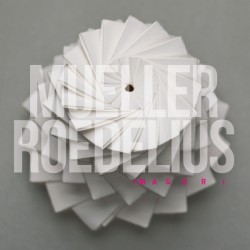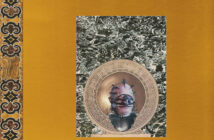Though I highly doubt there was any direct connection between Imagori and Dieter Moebius, I find it impossible to listen to the album without the weight of his recent death hanging over it and colouring my understanding of it. Moebius was, of course, Hans-Joachim Roedelius’ partner in crime in some of krautrock’s most important and enduring music in the form of Cluster and Harmonia. Their work always contained something of what became known as New-Age, but without any of the cliché drivel. While aspiring to the task of aural wallpaper (as did their sometime collaborator, Eno, who himself adds his spoken voice to one of the tracks here), they never really got there, being far too engaging. On Imagori, the piano plays the major role in creating any new-age reference, full of melancholy snippets of melody. These form the basis to what I, now, can’t hear as anything but a worthy eulogy to Moebius.
Which might be a shame as I’m certain that neither creator intended it that way, but it certainly doesn’t take away from the appeal of the music. It just, to my mind, gives a concrete subject to the largely wordless sonic explorations. That piano is not allowed to simply noodle, it is cut and chopped fairly harshly into looping sections, micro-edits bubbling through longer phrases. In fact, the processing could possibly even be considered as a duet partner for the piano, so intertwined are the two. Müller, no musical unknown himself, most well known from Gotan Project, can most readily be recognised in the dark, dubby bass and neo-trip-hop rhythm pulses laid out bellow the sometimes weeping piano lines. Add to this trickles of random static, alternately pulsing and piercing analogue synth sweeps and the whole adds up to a darkly claustrophobic web that is difficult to escape from. Attention to detail abounds throughout, the high gloss finish merely accentuating the emotionally disturbing factors – melodies, physically painful sounds – rather than blunting their effectiveness. The tracks’ genesis in improvisation is evident, but it is tightly edited, individual tracks growing in an arranged, song-style manner, while the overall album feels like a suite – consistent in its æsthetic, constantly unfolding, moving subtly and remaining engrossing. You’ve probably noticed a lack of picking out specific tracks in this review. That’s mainly because I hear the album as a single piece.
I’ve read this album described as too sealed and hermetic for its own good. I have to disagree with this assessment. It is certainly dark and enveloping, but in doing so is engaging. I become part of the world evoked by the minor key melodrama and I do find it very satisfying. Add the layer of unintended melancholy that comes with the timing of its release in relation to the passing of Moebius and it, at least in my head, comes with concrete emotion to make sense of the darkness. Imagori is a fine addition to the catalogues of both Müller and Roedelius, a balanced collaboration in which the strengths of each synthesise with the other.
Adrian Elmer




